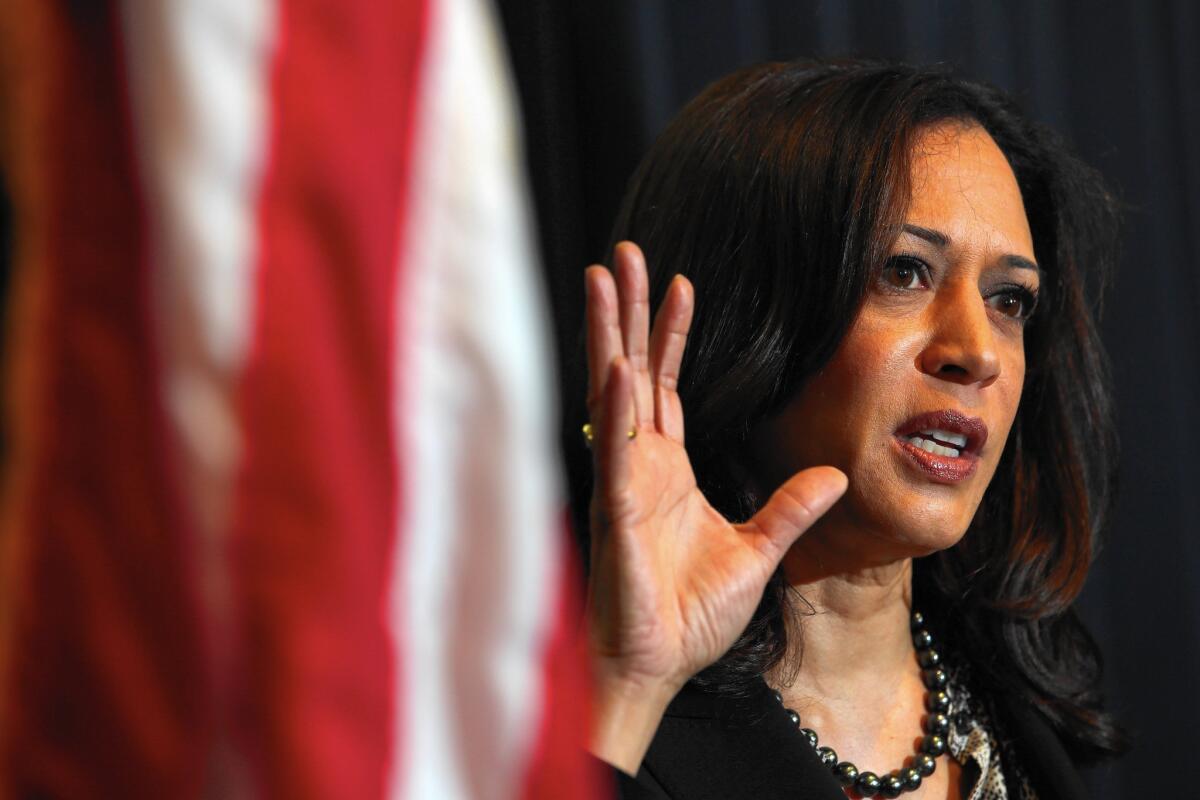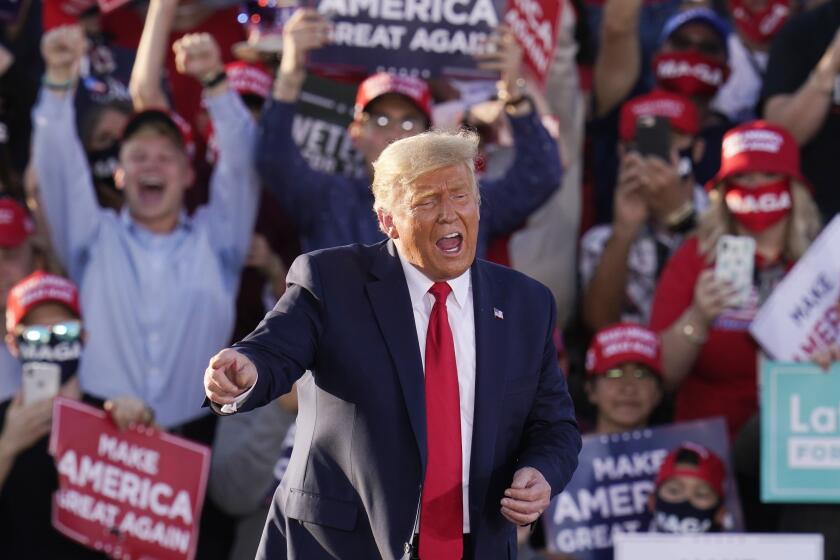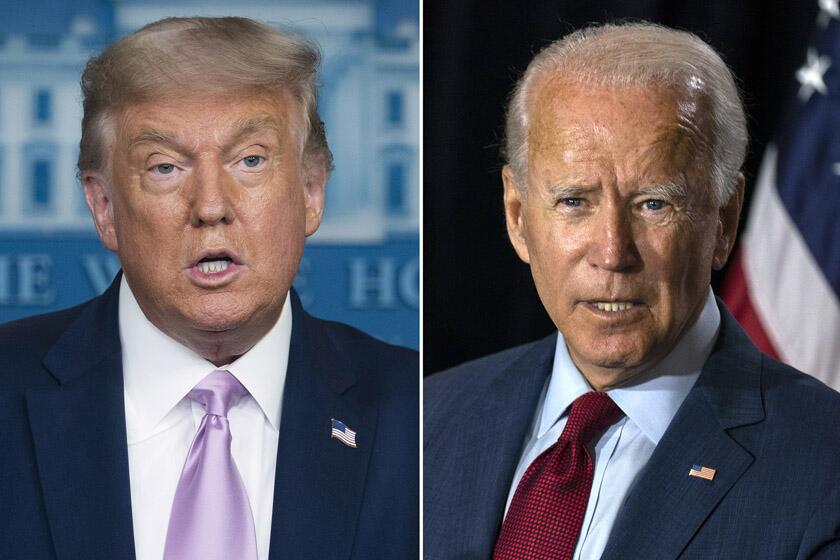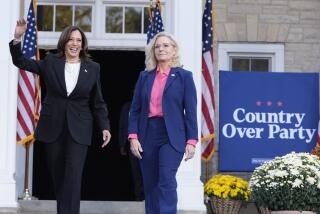After being her own boss, Kamala Harris embraces new role as Biden’s No. 2

Throughout her career — as San Francisco district attorney, California attorney general and a U.S. senator — Kamala Harris managed to call most of her own shots. Now, as the Democratic vice presidential nominee, her role is different: Talk up Joe Biden, attack President Trump, raise gobs of money and do nothing to upstage the top of the ticket.
It is no small adjustment. But she has, by many accounts, acquitted herself well, easing the concern of some in the Biden camp who worried about Harris’ ambitions and ability to subsume her personal interest and apply her skills wholly in the service of someone else. She did, after all, make her own unsuccessful run for the White House.
“She came in willing to assume whatever role necessary,” said Democratic Rep. Cedric L. Richmond of Louisiana, an early Biden supporter and co-chair of his campaign, who notes that he was not among the Harris skeptics. “She is delivering everything from fundraising to voter contacts to engagement with leaders.”
A daughter of immigrants from Jamaica and India, Harris has been a particularly beneficial emissary to the Black and Indian American communities, two loyal Democratic constituencies that Biden is counting on to win several key states.
“She is ... able to speak to communities of voters and potential voters that need to see the Biden-Harris ticket reaching out,” said Stefanie Brown James, co-founder of the Collective PAC, which supports and trains Black candidates. “She could have gone another direction... for the sake of attracting that white middle-class woman voter. She’s actually doubled down.”
President Trump’s closing message is a lot like his presidency: chaotic, controversial and notable for anger and theatrics. It may repel the electorate.
Having served in the White House under President Obama, where Biden sometimes drew unwelcome notice with his verbosity, the former vice president knows better than most the perils and parameters that come with the No. 2 job. Harris was equally mindful of those expectations and the conditions when she accepted Biden’s offer.
In joint appearances, she has been deferential, taking pains not to outshine the presidential nominee. During a recent swing together through Arizona, Harris spoke only briefly, yielding to Biden to parry questions from reporters. Harris answered one, about Trump calling her a monster after her largely civil debate with Vice President Mike Pence.
“No,” she said tersely. “I don’t comment on his childish remarks.”
Biden swooped in with a lengthier response, calling Trump “despicable” and “delusional,” and heaping praise on his running mate.
“This person has more integrity in her little finger than most people have in their whole body,” he said, angling toward Harris and gesturing with his trademark aviator sunglasses. “And the idea, it’s obvious he cannot, he has great difficulty dealing with strong women, great difficulty.”
Harris’ campaign schedule, circumscribed by the COVID-19 pandemic, appears calibrated so it’s ever-so-slightly dialed back from Biden’s regimen, lest it seem the 56-year-old vice presidential hopeful is outhustling a running mate who is more than 20 years her elder.
The deadly virus has limited Harris’ public exposure in other ways.
Her campaign events, like those of Biden, have been capped at small capacity to adhere with health guidelines. When two people traveling with Harris tested positive for the virus, she was forced to cancel several days of events.
Safety concerns also relegated her as a remote participant in the confirmation hearing of Judge Amy Coney Barrett, Trump’s hurry-up pick for a Supreme Court vacancy.
In previous settings, Harris lacerated Trump’s nominees, launching endless memes and, on the strength of her forensic chops, her presidential bid. So it was noteworthy — if not surprising — the former prosecutor took a comparatively mild approach, with a performance aimed more at blending in than breaking out. Her harshest criticism was reserved for Democrats’ chief nemesis.
“People are very, very scared,” she said. “They are scared that allowing President Trump to jam this confirmation through would roll back rights for generations.”
While Harris has dutifully lowered her profile — she declined to be interviewed for this article — it is Republicans who keep turning attention her way.
Last week, it was Georgia Sen. David Perdue, warming up a Trump rally in Macon, who conspicuously mispronounced her first name, in what has become a familiar Republican trope. (Perdue and Harris have served together for more than three years, including on the Senate Budget Committee.)
Trump has personally shoved Harris front and center in his lagging campaign, an unusual presidential focus on the vice presidential nominee.
“His handlers and the Fake News Media are doing everything possible to get him through the Election,” Trump tweeted last month about Biden. “Then he will resign, or whatever, and we are stuck with a super liberal wack job that NOBODY wanted.”
He went after Harris again Tuesday night at a rally in Erie, Pa. “She will not be your first woman president,” he said, “she will not be. Can’t let that happen.”
Allies have amplified the attacks. One TV spot broadcast in Wisconsin and North Carolina by a pro-Trump political action committee warned that a “Harris-Biden” ticket would stoke violent protests in cities across the country. Harris, not Biden, was the only Democrat pictured in the ad.
Part of that focus is an effort to undermine the former vice president, a relative Democratic centrist, by making the case he is a mere front for Harris, whose political grounding in uber-progressive San Francisco suggests, to some, a sign of off-the-hinges liberalism.
Part of it is Trump’s penchant for attacking women — especially women of color — who challenge him.
“I don’t think it’s about him actually thinking she’s going to run the country,” said Christina Reynolds, a spokeswoman for Emily’s List, a group that works to elect women who are abortion rights advocates to office. “I think it’s about him wanting to use her and her gender and her race as a weapon.”
A look at where President Trump and Joe Biden stand on key issues in the 2020 election, including healthcare, immigration, police reform and climate.
Before joining the presidential ticket, Harris had a warm, if not especially close, relationship with Biden, owing to her friendship with Biden’s late son, Beau. He was attorney general of Delaware while Harris served as California’s top prosecutor.
Although Harris and Biden clashed fiercely during the primary season, the two had mended relations well before they became running mates. They now connect frequently by phone and have a good, albeit socially distanced, chemistry, according to people close to the two. Forging a strong relationship, say those who know Harris, remains a paramount goal.
Signing on as Biden’s running mate forced Harris to make other adjustments, apart from channeling her aspirations into his success.
For most of her nearly two decades in public life, Harris kept the same coterie of family and California-based strategists by her side. Most of that inner circle is now shunted to the sidelines, or at least unofficial roles, as Harris brought over just a handful of staffers to augment those assigned to her by the Biden campaign. (She has kept in touch with some longtime associates via text and phone calls.)
Those who have spoken with Harris say she sees the changes — in style, in her approach to campaigning, in the faces surrounding her — worth the goals she now pursues: replacing Trump with Biden and becoming the first female vice president in history.
“Breaking barriers involves breaking things,” Harris recently told hundreds of women dialing into a Zoom fundraiser. Difficult though it can be, she said, “it will be worth it every single time.”
More to Read
Get the L.A. Times Politics newsletter
Deeply reported insights into legislation, politics and policy from Sacramento, Washington and beyond. In your inbox three times per week.
You may occasionally receive promotional content from the Los Angeles Times.














